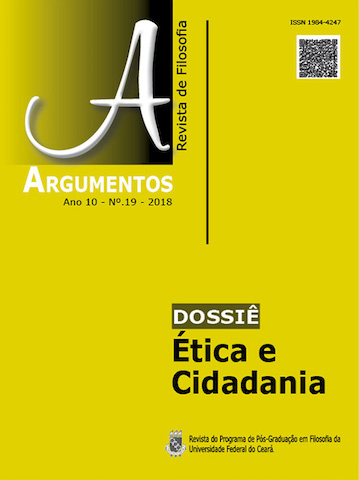A dimensão histórica e social da ciência em Popper
Palavras-chave:
Ciência. Tradição. Instituições. Objetividade. Progresso cientifico.Resumo
O objetivo do presente trabalho é mostrar que a teoria da ciência de Popper, apresentada inicialmente em sua obra A Lógica da pesquisa cientifica, na qual a ênfase era dada aos aspectos lógicos, foi complementada, em obras posteriores, por uma abordagem que dá ênfase aos aspectos históricos e sociais. Essa nova abordagem se delineia quando o filósofo elabora uma teoria racional da tradição e uma teoria institucional da objetividade e do progresso cientifico. Deste modo, a ciência passa a ser definida não apenas por meio de um critério lógico, mas também, por seguir uma tradição, de não apenas receber as teorias produzidas, mas de criticá-las e por depender de instituições que fomentem o debate e a critica de teorias de modo a garantir a objetividade e o progresso cientifico.
Referências
CAPONI, G.A. “De Viena a Edimburgo: Karl Popper e os dois programas da sociologia do conhecimento”. Revista Reflexão, São Paulo, n. 64-65, jan.-ago. p. 77- 106, 1996. Disponível em: http://www.scientiaestudia.org.br/associac/gustavo caponi/07%20CAPONI%201996%20De%20Viena%20a%20Edimburgo%20%20 Popper%20e%20a%20Sociologia%20do%20Conhecimento.pdf
JARVIE, I. C. The republic of science: the emergence of Popper’s social view of science 1935–1945. Series in the Philosophy of Science of Karl R. Popper and Critical Rationalism. Amsterdam: Rodopi, 2001.
______.“Popper’s Republic of science”. Disponível em: http://fs1.law.keio.ac. jp/~popper/v7n1jarvie.html
KUHN, T. S. A tensão essencial. Lisboa: Edições 70, 1989.
______. “Lógica da descoberta ou psicologia da pesquisa?”. In: LAKATOS, I. et MUSGRAVE, A. A crítica e o desenvolvimento do conhecimento. São Paulo: Ed. Cultrix, 1979.
POPPER, K. R. A lógica da pesquisa científica. São Paulo: Ed. Cultrix, 1972. ______. Conhecimento objetivo. Belo Horizonte: Ed. Itatiaia; São Paulo: Ed. da
Universidade de São Paulo, 1975.
______. Lógica das ciências sociais. Rio de Janeiro: Tempo Brasileiro, 1978.
______ . Conjecturas e refutações. Brasília: Editora Universidade de Brasília, 1982.
______. O Realismo e o objetivo da ciência. Lisboa: Publicações Dom Quixote, 1987.
______. O mito do contexto: em defesa da ciência e da racionalidade. Lisboa: Ed. 70, 1999.
RANSANZ, A.R. P. Kuhn y el cambio cientifico. México: Fondo de Cultura Económica, 1999.
VELASCO, A. “La hermeneutización de la filosofia de la ciência contemporânea”. In: ______. Dianóia. v. XLI, Universidad Nacional Autônoma de México/Fondo de Cultura Econômica, 1995, p. 53-64.
______. “Universalismo y relativismo em los sentidos filosóficos de tradição”. In: Dianoia. Anuario de Filosofia. Año XLIII, núm. 43. México: Instituto de Investigaciones Filosóficas - UNAM/ Fondo de Cultura Económica, 1997. p. 125-145.
______. “Hacia uma filosofia social de la ciência em Karl R. Popper”. ______. Signos Filosóficos, suplemento n. 11, v. IV, 2004, p. 71-84.
Downloads
Publicado
Edição
Seção
Licença
Autores que publicam nesta revista concordam com os seguintes termos (SOBRE COPYRIGHT E POLÍTICA DE ACESSO LIVRE):
1. Autores mantém OS DIREITOS AUTORAIS concedidos à revista OU Direito de Primeira Publicação, com o trabalho simultaneamente licenciado à Atribuição de Licença Creative Commons (CC BY) que permite o compartilhamento dos trabalhos com reconhecimento de autoria e publicação inicial nesta revista.
2. Autores têm permissão para aceitar contratos, distribuição não-exclusiva da versão do trabalho publicada nesta revista (por exemplo: publicar no repositório institucional ou como um capítulo do livro), com reconhecimento de autoria e publicação inicial nesta revista.
3. Autores têm permissão e são estimulados a publicar e distribuir seu trabalho on-line (por exemplo: em repositórios institucionais ou em sua página pessoal) mesmo durante o processo editorial, haja visto que isso pode aumentar o impacto e citação do trabalho publicado.




.jpg)










._._3.png)
1.jpg)
._._._.png)
